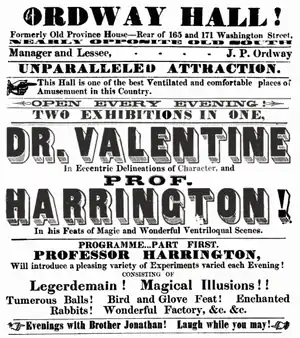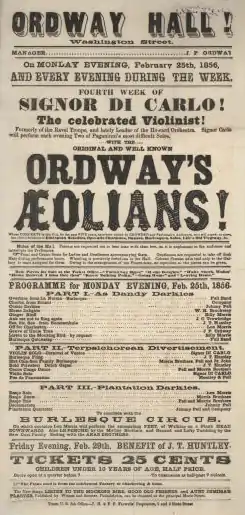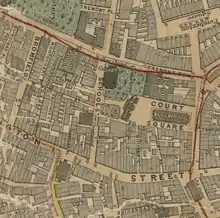Ordway Hall (Boston)
Ordway Hall (est.1852) was a theatre in Boston, Massachusetts located off Washington Street in the former Province House. John P. Ordway established and managed the hall, which specialized in "negro minstrelsy,"[1] particularly the Ordway Aeolians, his own troupe.[2]

History
Ordway Hall opened February 9, 1852.[4] "The Old Province House, in the rear of 165 and 171 Washington-street, has been neatly fitted up for a concert-room, under the name of Ordway Hall. At this comfortable and well-ventilated place of amusement, conducted on the best principles, the 'Aeolians,' under the management of J.P. Ordway, in the double capacity of 'citizens' and 'darkies' give nightly concerts which are well attended."[5] "The whole building was changed in appearance, its interior having been remodeled for the purpose of accommodating a company of ... vocalists. ... The outside was covered with a coat of yellowish mastic."[6]
A travel guidebook of 1856 recommended the theatre: "The walls of this old house, that once echoed with kings' decrees, eloquent speeches, and loyal toasts, now ring with the gay laugh, tender songs, and humorous jests of the negro minstrel. The hall ... has become deservedly popular, as order is preserved, and all that may offend banished."[7]
"Lon Morris, Billy Morris, and other famous minstrels of the day were in the company, and here it was that P.S. Gilmore, the well-known band-master, began his professional career by playing on the tambourine as an end-man."[8] In 1858, E. Kelly worked as musical director, and James McGee as business manager of the hall.[9]
In 1851, the 12-year-old future founder of pedestrianism Edward Payson Weston worked at the hall "selling candies ... during each secular evening."[10] Around 1856, the Parent Washington Total Abstinence Society met weekly in the hall.[11] On September 17, 1856, during the elaborate citywide festivities inaugurating the new statue of Benjamin Franklin at City Hall, "the entrance to Ordway Hall ... was decorated with flags, and a portrait of Franklin."[12] Police arrested a woman at the hall in 1860 "for being in male attire."[13]
By 1864, Morris Bros., Pell & Trowbridge occupied the hall.[14] "On Tuesday evening October 25, 1864 a fire gutted the interior, leaving only the walls. The building was then turned into an office building."[15][16]

Events
- 1853, January – Uncle Tom's Cabin[17]
- 1855 – J.B. Donniker & T. Christian[18]
- 1858, May – Buckley's Serenaders[19]
- 1859, July – George Christy's Minstrels.[20]
- 1859, December – Amanda M. Spence, psychic medium[21]
- 1861 – Morris Brothers, Pell & Trowbridge's Minstrels[22]
- Mr. Gurnet and "the visible spirit Rapping Bell, the Mystic Gold Box, Bottle Feat, Crystal Casket"[23]
References

- Edwin Monroe Bacon. Washington Street, old and new: a history in narrative form of the changes which this ancient street has undergone since the settlement of Boston. Boston: Macullar Parker Co., 1913.
- "John P. Ordway M.D." in: Oliver Ayer Roberts. History of the Military company of the Massachusetts, now called the Ancient and honorable artillery company of Massachusetts. 1637-1888, Volume 4. Boston: A. Mudge & Son, printers, 1901; p.91.
- Advertisement for Ordway Hall, reproduced in: Milbourne. Magic: A Picture History. Courier Dover Publications, 1991.
- Edward Hartwell Savage. Boston events. Boston: Mutual News Co., 1886; p.108.
- "Ordway's Aeolians." To-Day: a Boston Literary Journal. No.24, June 12, 1852; p.380.
- The Old Province House, Boston. Historical Magazine v.8, no.13, Dec. 1864; p.394.
- R. L. Midgley. Sights in Boston and suburbs: or, Guide to the stranger. Boston: J. P. Jewett & company, 1856; p.109.
- Herndon and Bacon, eds. Boston of to-day: a glance at its history and characteristics. With biographical sketches and portraits of many of its professional and business men. Post Publishing Company, 1892; p.94.
- Boston Evening Transcript, Nov.30, 1858.
- Edward Payson Weston. The pedestrian: being a correct journal of "incidents" on a walk from the state house, Boston, Mass., to the U.S. Capitol, at Washington, D.C., performed in "ten consecutive days," between February 22d and March 4th, 1861. NY: E.P. Weston, 1862; p.47.
- Massachusetts register and business directory. 1856; p.234.
- Boston City Council. Memorial of the inauguration of the statue of Franklin. 1857; p.99.
- A singular story. Wisconsin Daily Patriot, May 5, 1860. "She stated that she belonged to a respectable family in New York State, and had been married about 3 months. Her husband had treated her very badly, and in Philadelphia, where they went to reside immediately after their marriage, he pawned nearly half her clothing. They came to Boston from Philadelphia, and have since been boarding in a private family. Her husband has upon some pretext, and partly by threats, prevailed upon her to don male attire. At the time of her arrest her husband was near by and in fact followed the officer and herself part of the way to the station house. She expressed much gratifications at her detention by the police, as she hoped it would relieve her from her husband's cruelty."
- Boston Directory. 1864.
- Watkins and Candee. The Province House and its occupants. Old-Time New England. v.62, no.228, Spring, 1972; p.104.
- Savage. 1886; p.108.
- Sarah Meer. Uncle Tom mania: Slavery, Minstrelsy, and Transatlantic Culture in the 1850s. University of Georgia Press, 2005; p.301.
- American Broadsides and Ephemera, Series 1, no. 9365
- Edward Le Roy Rice. Monarchs of Minstrelsy, from "Daddy" Rice to Date. NY: Kenny publishing company, 1911; p.116.
- New York Herald, July 25, 1859; p.5.
- Mrs. Amanda M. Spence at Ordway Hall, Boston." Banner of Light, December 24, 1859, p.4. Cited in: McGarry. Ghosts of Futures Past: Spiritualism and the Cultural Politics of Nineteenth-Century America. University of California Press, 2008.
- Boston Evening Transcript, Jan. 7, 1861.
- Houdini's History of Magic in Boston, 1792–1915.
Further reading
| Wikimedia Commons has media related to Ordway Hall (Boston). |
- Silvery midnight moon! Song and chorus. Companion to the popular song and chorus, "Twinkling stars". As performed by Ordway’s Aeolians. Boston: J.P. Ordway, Ordway Hall, Washington Street, 1856.
- William L. Slout. "Ordway's Aeolians." Burnt Cork and Tambourines: A Source Book for Negro Minstrelsy. San Bernardino, Calif. : Borgo Press, 1995.